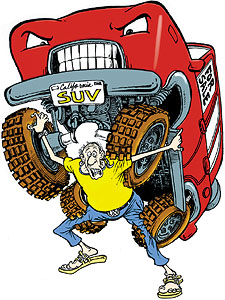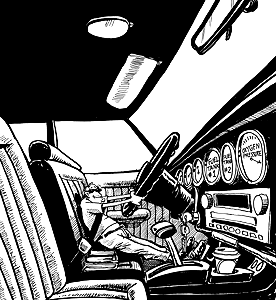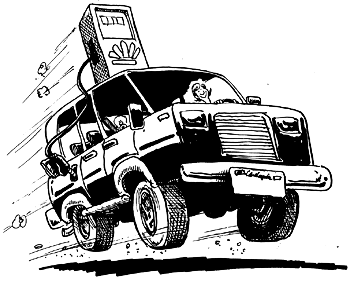![[Metroactive Features]](/features/gifs/feat468.gif)
[ Features Index | Silicon Valley | Metroactive Home | Archives ]
 SUV Zero Driven to re-evaluate their lives post-Sept. 11, people rethink their gas hogs By Michelle Chihara Illustrations by DeCinzo Sport utility vehicle sales are reaching record highs. With 21 million already on the road, projected sales this year will top 3.5 million. The Detroit automakers are luring customers with flag-waving ads and 0 percent APR financing plans, and the hard sell seems to be paying off. Except for that pesky SUV guilt. With all eyes on the Middle East and Central Asia, many Americans have been reminded of our unsustainable dependence on foreign oil. In an act of guilty patriotism, some of them--namely, some liberals--are finally swapping their gas-guzzling behemoths and replacing their SUVs with eco-friendly cars. "It's gone," says Christina Allen, vice president of politics at Working Assets, a progressive phone service and media company. "It was a 1999 Ford Explorer. I wanted to sell it before Sept. 11, but then, afterwards, it was just too much. I felt I was contributing to all of the problems we had, with oil imports and everything." Allen isn't alone. "SUVs, Jeeps, anything that's guzzling gas--they're trading them in," says Mike Azcona of Dirito Brothers Volkswagen, which claims to be the second-largest Volkswagen dealer in the country. According to their sales reports, Azcona says, "We've had roughly the same number of trade-ins [in the past 90 days, as last year], but we've had almost triple the amount of Jeeps, double the amount of Explorers, about 50 percent more 4Runners ..." Here in the valley, Lucian Naum of the number one rated Bob Lewis Volkswagen says he hasn't seen a slowdown in SUV sales at the company's sister Hyundai and Suzuki dealerships, which sell the "Santa Fe" and "Vitara" utilities. Then again, with models fuel-rated as high as 27, they're not exactly in the same class as, say, a Range Rover with a highway rating of 15. "Both are selling very well," Naum brags. And while many light-truck dealers say they haven't noticed a lot of SUVs coming in for trades, some do say the season has been slow. "It's been a dramatic slowdown," says Joseph Johnson, manager at a Ford dealership in Northern California. "We usually do 25 to 30 a month, and we've only sold five or six since last month." At the head of this SUV-free charge is author Arianna "automotive fashionista" Huffington, with a recent column that rallies readers to "Support Our Troops, Dump That SUV" (she actually made the oft-quoted fashionista comment by saying she doesn't consider herself a trendy auto buyer). Reminding us that "SUVs consume over six miles per gallon more than a family station wagon," Huffington says, "We can't go on consuming 25 percent of the world's oil while being only 5 percent of the global population. At least not if we want to get serious about putting the screws to any number of oil-rich and terrorist-friendly nations. ... As well as giving up our SUVs--or, even better, switching to hybrid gas-and-electric cars that currently get up to 64 mpg--we can all make simple adjustments to wean our country from the foreign oil teat, even if our leaders are too dazed by the energy and auto industry lobbies to guide us."
Down, Boy Sentiments like these have finally prompted people like Working Assets' Allen to sell their guzzlers. But what was Allen, a progressive working for a progressive company, doing with an SUV in the first place? "When I bought it, it was sort of a safety issue," she says. "Definitely not based on a safety-test-related thing," she clarifies, "but as a single parent, driving that car, there was a certain sense of security, for some reason." But the guilt eventually got her. "The ostentatiousness of it started getting to me," Allen confesses. "The irony was that driving it made me feel less secure--how in-your-face it was. I wanted to be less profligate in how I lived my life." The replacement was clear for the reformed SUV-owner. "I bought a Volkswagen." Of course, SUV guilt and fashionista pleas aside, SUVs still make up almost half of American car sales. The SUV Lovers (sorry) Owners Association is gaining press coverage and members (at www.suvoa.com), led by a charismatic Korean War vet. Ask your local truck dealer, and he'll probably deny any decline in SUV sales. So maybe it's not a full-fledged, down-with-SUVs rebellion just yet. But at least the tremors of guilt on the radar signify some progress in the image war, in the semiotic fight against the SUV. Because the struggle over the SUV is not one of facts, or even of principle. It is a war of symbols, of cool vs. fuel efficient, of feeling tough vs. actually being safe, of bling-bling vs. the environment. We know that their center of gravity is ridiculously high, that they roll over faster than you can say, "Down, boy," that their bumpers ram straight into the passenger compartments of other cars during collisions. But secretly, in our darkest heart of hearts, we have always known that me-big-truck-crush-other-vehicles was part of the SUV appeal. SUVs make the soccer mom feel tough and the working stiff feel active. For more than a decade now, that appeal has trumped activists and environmentalists alike--from lone-gun activists to NPR's Car Talk and the Sierra Club--in their efforts to educate us. That's because everyone already gets that the SUV is a gas-guzzling, smog-emitting, inefficient, expensive, hazardous, über-yuppie icon. Everyone wants one anyway. SUVs are "symbols of high social status in the city and suburbs" and "oversized phallic symbols," notes a representative of Harm Stryker, a "collective of autonomous direct action activists." And Stryker says improvement is slow. "People are probably selling off their big trucks and luxury sedans for minivans and station wagons not because they fear global warming or care for their neighboring drivers, but because they fear that their insurance premiums and miles per gallon will cost too much during an expected recession," writes Harm Stryker via email. "As time passes, and people realize that the U.S. economy is not in as much jeopardy as they thought, the spending will increase." So far, it's true that while the sticker campaigns have proven provocative, it's hard to point to any hard results (beyond providing fodder for the angry SUV-rights brigade). Dubious of any improvement, Stryker says that while their own sticker campaigns may have prompted prospective buyers to reconsider, they don't seem to have prompted most owners to sell--yet. Green Envy The Sierra Club, savvily, now targets the manufacturer, not the too-cool-to-touch SUV itself. While the group repeats that "SUVs used to be used to haul bales of hay, they're now used to haul lattes from Starbucks," as spokesperson Alex Vietch reminds us, ultimately the Sierra Club blames the maker. "It's down to the Big Three automakers to make cleaner SUVs so people will choose them over SUVs that cost a fortune at the gas pump," Vietch says. Seems the Sierra Club doesn't want to touch on the sensitive subject of SUV guilt. It would be dangerous, of course, to make the huge SUV-owning constituency feel too bad. They might stop donating. But all hope is not lost, even when progress is slow. Station wagons--the very symbols of vehicular uncool--are managing a slight comeback, led by former SUV drivers. They now come complete with fancy new names like "five-doors" and "Multi-Activity Vehicles." Meanwhile, sales for the Prius, Toyota's hybrid fuel-and-electric car, have not gone down with the price of gas. "Right around Sept. 11 and a little before, when there was a huge hit in gas prices, we saw a slight slow-down in four-wheel-drive sales," says Martin Chan, a hybrid sales manager for Toyota. "People were leaning toward fuel-efficient cars, and with the economy going downhill, people's budgets got tighter. People want to spend a little less money." Chan links continued interest in the Prius to the war, even when it has nothing to do with politics or environmental guilt. "With the war and all that, people aren't sure where gas prices are going to go," Chan says. So, at this point, there's a four-month wait for the thing. Sometimes economics is all that matters. "I never really felt guilty," says Dave, a 26-year-old Jeep Wrangler owner trying to sell. "I mostly got it because I could take the top off and go off-roading, and I never really did either." So when Dave hit hard economic times, "it just wasn't worth it anymore."
Living Large But for progressive types, if there is no SUV justification, there is self-flagellation. "I'm probably one of the few SUV owners who's actually used four-wheel drive on a regular basis," says Sophie, a 30-year-old IT marketing professional and owner of a '91 Pathfinder. "I'm active enough, I haul enough stuff around to warrant a big car." But since she moved back to the United States from Australia, Sophie says her surfing, climbing and camping have dropped off. "I don't tend to do that here," she says. Now, as soon as she finds time, Sophie is planning on selling. Another Bay Area SUV seller is even harder on himself. "Seriously, I was being retarded when I bought the car," says Stan (not his real name), who is now eager to unload his Land Rover Discovery SE. "I never liked the car. It guzzles a lot of gas. I feel guilty; I feel like a dickhead driving it. I was in love when I bought it. I just wasn't thinking." Stan wasn't in love with the car. He was in love with a woman who convinced him that the car would come in handy. "She thought it was awesome," Stan says. And he insists the two did use it for outdoor purposes. But then she broke his heart, his social conscience reawakened, and now he's desperate to sell. "Now I'm sharing a super-efficient Volkswagen with two other people in my building," Stan says. He's not in the market for a Prius, because "all these specialty vehicles have stipulations attached, and it's ugly. It's like your mom's car." Despite having purchased the SUV, Stan says, he has principled reasons for letting it go. "My reasons were political from the very beginning." The compunction-ridden are among us. But it's hard to know if the trend has finally peaked, or if we have to ride out an arms race of mine-is-bigger until we're all driving monster-monster-monster trucks on the freeway. Is 0 percent APR financing a death throe or just another effective last-ditch marketing ploy? The SUV's death knell has been sounded before, after all. Critics in the press sounded it when gas prices went up, when Nissan's and Ford's sales slid, when Porsche announced the 2002 launch of the Cayenne--a name "understood worldwide as synonymous for spiciness, adventure and joie de vivre," the press release states. Surely, the image of a huge, red, Cayenne chile pepper on wheels had to signal the trend's moribund decadence? We can only hope. "Dump the SUV," writes SUV-free Huffington. "I hope it's going to be some sort of movement," says the SUV-free Allen. Could it be a nascent rallying cry? Rise up on the tarmacs, ye SUV owners! Say 10 Hail Marys and sell, sell, sell! [ Silicon Valley | Metroactive Home | Archives ]
|
From the December 13-19, 2001 issue of Metro, Silicon Valley's Weekly Newspaper.
Copyright © 2001 Metro Publishing Inc. Metroactive is affiliated with the Boulevards Network.
For more information about the San Jose/Silicon Valley area, visit sanjose.com.

